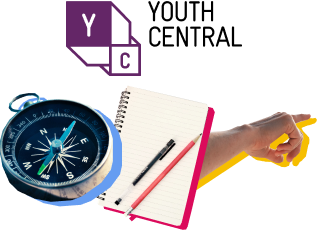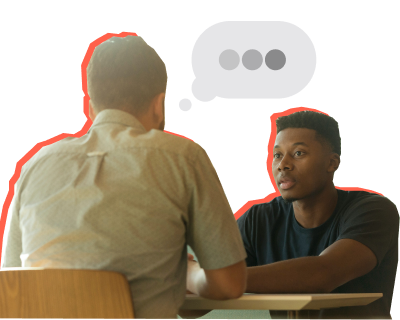Never been to a job interview before? Don’t worry, most job interviews are similar and the questions you’ll get asked are fairly predictable.
With the right preparation you can build your confidence, be ready for any question and get that job.
What is a job interview?
A job interview is simply a conversation between you and your potential employer.
The employer will ask you some questions and you answer them.
The employer will decide whether they will hire you based on the answers you give and your experience.
79%
of Australian employers say first impressions influence a hiring decision
Do your research and be prepared
When you first learn about a job interview, sit down and read the job description.
Make yourself some notes. It could be a good question you have. Or a particular thing you think would be helpful to share with them.
Most of the questions they will ask you in the interview will be based on the job description. So starting with the job ad is a great way to get prepared.
Carefully review the job ad in detail to understand what is required in the role.
You might like to write a couple of things under each job description heading that you could use to respond. Remember to print or write this out and take it with you.
Think about what you will wear. Your clothes should be clean, neat and as plain as possible.
If the interview is online or on the phone, make sure you have somewhere quiet with no distractions to sit, have access to good wifi, and headphones if you need them.
Be yourself! It's as much about you determining if they are a good fit for you.
Find your calm
If you get nervous, think about strategies for staying calm.
This might mean closing your eyes and taking some deep breaths before the interview starts. Or it might mean having a mantra or some positive thoughts you tell yourself.
Sometimes having a glass of water is a great way to pause and take a moment between questions.
The calmer you feel, the more in control you will be.
Arriving at the job interview
First, it’s important to arrive early.
Make sure you plan your travel so you can arrive 10 minutes before the interview. Arriving early to an interview is a great first impression.
It’s good to make a first impression, but it’s more important to be yourself.
You don't need to pretend to be someone else to get a job.
You can be more polite or formal than you would be every other day, but you should still be you.
For example, if the interviewer asks to shake your hand, but it is against your culture or beliefs to shake hands with someone of the opposite gender, then you should decline.
Or perhaps you find it challenging to make direct eye contact or have a stutter. All these things are okay, and you shouldn’t let them affect your interview.
Don’t worry too much about being perfect, just try your best and let your personality shine.
Depending on how you manage personal information like cultural beliefs or a disability, you may like to mention it before the interview, or at the start if that makes you feel more relaxed.
Just don’t feel any pressure to do so if it doesn’t feel right for you.
If you have accessibility needs, you can ask when they call for the interview if the location of the interview is suitable for your needs.
If you have a disability, have a think about whether you want to disclose this information – it is entirely your decision.
The conversation before the interview starts
The interviewer will usually start by making some polite conversation.
This is a good chance to get warmed up for the interview.
The interviewer might ask:
‘Did you have any trouble finding us?’
‘How about that weather?’
Try to answer in a polite way even if you’re feeling shy and don’t usually say much.
You could ask some questions of your own to keep the conversation flowing.
You might ask:
‘What is it like working here?’
‘How long have you worked here?’
It might not seem important to make polite conversation but it matters.
The polite conversation is actually a part of the interview, especially if you want a job talking to customers. They might like to see that you can make conversation easily.
I was way too nervous for my first job interview. It turned out to just be a casual chat with the newsagency owner.
Starting the interview
Before they start asking you questions, the interviewer will usually tell you about the organisation and the job.
The first couple of questions will usually be simple ones to help you get comfortable. Examples of these questions include:
‘Tell me about yourself.’
‘Why did you apply for this job?’
The core of the interview
This will usually be questions about how you behave in certain situations.
The interviewers want to know you’ve got the right skills and experience to do the job.
Example questions
- Can you tell us about a time something didn’t go right, and how you fixed it?
- If a customer was unhappy, what might you do to help them feel better?
- What are some of your greatest strengths?
- What interests you about this particular industry or role?
- Where do you see yourself in 5 years?
- How do you handle failure or something not going the way you want it?
If you ever feel unsure about how to reply to a question or don’t understand, you can just ask them to repeat it.
This also gives you some time to think and hearing it said a different way may help with your answer.
If English isn’t your first language, asking them to provide an example, or to ask the question differently can be really helpful.
You can also repeat the question back to them. An example might be:
Interviewer: 'Tell us about a time that you made a mistake at work and how you fixed it?'
You: 'So a good example of when I made a mistake at work would be...'
This gives you time to think of a response and they can correct you if you have misunderstood the question.
Remember to refer to your notes if you get stuck.
If you feel like you didn’t answer something the way you would have liked, and you think it‘s important, just say something like, 'Just back to that previous question, I would just also like to add...'
If you make a mistake, forget something, or don’t answer something how you would like, it is important to not focus on it and just move on.
The interviewers will expect you to be nervous and make mistakes. Try not to overthink it and stay focused on what is next.
Your chance to ask questions
Once the interviewers have finished asking questions, they’ll usually give you a chance to ask your own questions.
It’s good to have at least one question ready to ask.
This could be something you’ve prepared based on your research before the interview.
It could also be something from the interviewer’s introduction that you want to know more about.
For example, you could ask:
‘What do you see as the main challenge for this job?’
‘Do you offer opportunities for training?’
The end of the interview
At the end of the interview, you should thank the interviewer for the opportunity to be interviewed.
You could also ask them about the rest of the application process and how long it will be before they let you know if you’ve got the job.
You might be relieved the interview is over, but it’s best not to relax too much.
Keep your behaviour formal and professional until you’ve left the workplace.
Practice makes perfect
The more interviews you do, the better you will become at them.
There are lots of different jobs out there. You aren’t the only one applying so never take it personally if you don’t get the job you wanted.
You aren’t always going to have the exact experience they are looking for and that’s ok!
It’s more important to show that you are willing to learn, can communicate well and will bring other skills to the role.
Don’t worry too much if you feel you didn’t do well in the interview - there will be others. Practice helps.
Remember:
- Phone or virtual interview? Make sure your phone or laptop is fully charged.
- Be yourself!
- Mistakes are expected. Just move on and try to stay focused on the next question.
- Ask questions! It shows you are interested and want to work there.
- If you don’t understand a question just say that you need them to explain further.
- Ask for feedback on your interview and what you can do better next time.
- You don’t have to take the job if something doesn’t feel right for you.

Ready to put your skills into practice?
Get comprehensive guidance on job interviews at Youth Central.






